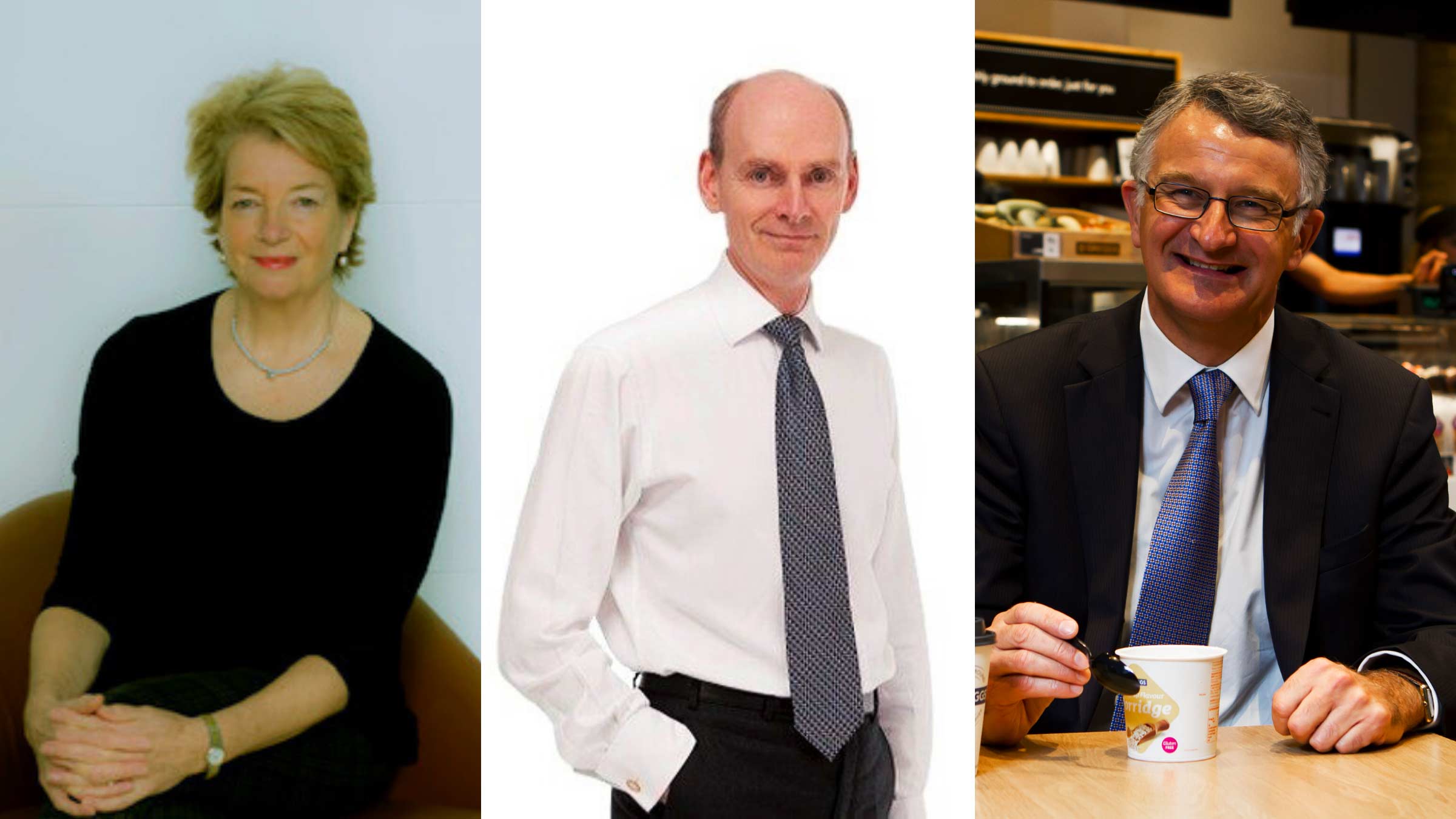It is not often that I get the chance to chat to and to challenge three influential Chairs for an hour. It was therefore a privilege to facilitate a conversation between three of our sector’s most important figures last week: Richard Pennycook, Penny Hughes and Ian Durant. The webinar – attended by more than 70 NEDs representing 250 companies in the consumer-facing sector – was focused on the role of the non-executive board in a crisis, and how NEDs can rise to the challenge of guiding their businesses through Covid-19.
When Allan Leighton coined the term ‘going plural’ in the early 2000s, I don’t think anyone would have envisioned a scenario like today, requiring portfolio NEDs to focus on multiple crisis situations simultaneously. With this in mind, all three panellists agreed that Covid-19 has not only had a significant impact on the frequency of their engagement with their portfolio businesses, but also the nature of their participation.
“Obviously,” explained Penny, “there’s increased structural participation – with more board meetings focused on finance, capital, and liquidity – but there’s also far more informal engagement as we support our executives through this period. Our executives are all at home, unable to directly communicate with or lead their teams, and they need our support. This has been a focus since the crisis”
Richard echoed this point, drawing from his own experiences to reiterate the crucial role Chairs and NEDs play in supporting their executive teams. “As Chairs, being able to provide some emotional support to our CEOs is vitally important at this time. The thing that kept me awake at night when I was CEO was: ‘I’m running a business that can impact people’s health’, and of course right now for all our CEOs they’re having to live with that burden of responsibility. It’s a hugely stressful time for executives, and so providing emotional support, through virtual cups of coffee and chats, has become a big part of my job!”
Ian agreed, commenting: “it’s also really important to establish a tone of support that has nothing to do with blame… blame is not part of the discussion. All the board can do is make decisions about what’s going to happen in the future, not what has happened in the past.”
Emotional support – helping executives stay resilient – has undoubtedly become a crucial part of the NED remit in the last few months. I wonder… what else about the role has changed since the crisis?
“The pace of decision making, and the level of board engagement required in this period has set Covid-19 apart from any other crisis I’ve had to deal with in my career,” Ian offered.
Richard and Penny agreed. “In crisis management, the ways of doing things and making decisions have to change and communication lines have to shorten,” Richard told the listeners. Penny built on his point, saying: “you need to be able to hit the ground every time you have a call, every time you speak. You have to be engaged right there and be able to deal with the difficult things within the hour. Covid-19 has made us all find new ways of being efficient.”
“You need to be able to hit the ground every time you have a call, every time you speak. You have to be engaged right there and be able to deal with the difficult things within the hour. Covid-19 has made us all find new ways of being efficient” – Penny Hughes, Chair at The Gym Group and iQ Student Accommodation

One point that resonated particularly strongly throughout the webinar was the crisis’ ability to reveal the strengths and weaknesses that exists within a business.
“One thing that this has really shone a light on is the health of your boards,” explained Ian, “characteristics like having a broad range of skills that can be applied to many situations, a high level of trust between the executives and the non-executives, an adaptable style of engagement… all of these get tested very, very rapidly in this sort of situation.”
“This has revealed just how important it is to get the composition of the board right up front,” concurred Richard. “I’ve always been very conscious to make sure that I’ve got non-execs around me who can rise to the challenge at times like this and provide serious input. It is a great example right now of why having a flexible board is so important: you need to be able to call on your portfolio non-execs to put a shift in, recognising that you’re going to get less time from serving execs who are fighting their own fires.”
Despite the incredible pressure our consumer sectors have been under, we have witnessed some striking displays of humanity and charity in the last few weeks. I ask Richard, Penny and Ian what impact they feel Covid-19 has had on their businesses’ ESG agenda.
“Encouragingly, even before the crisis, ESG was higher on the agenda than it had been for a very long time,” said Richard. “A few years ago, people’s eyes would glaze over when the topic came up – but now corporate UK is taking it much more seriously, and Covid-19 will only accelerate this trend. And for our colleagues and our customers, our behaviours right now will be etched on their consciousness for years to come. Doing the right thing will pay huge dividends for companies that exhibit the right values.”
“Our behaviours right now will be etched on their consciousness for years to come. Doing the right thing will pay huge dividends for companies that exhibit the right values” – Richard Pennycook, Chair at Howdens, On The Beach and 2 Sisters Food Group
Ian furthered Richard’s point: “For me, the question of how companies treat their employees has become absolutely centre during this crisis and will continue to be so. In fact, it’s really interesting to see how much dialogue is happening around reopening businesses. We’re seeing active engagement with employees, and it’s bolstering to see businesses really listening and taking their workforce’s opinion on board around what’s safe and what they consider to be a healthy approach to reopening.”
The notion of ‘doing the right thing’ can also be applied to rebuilding companies at board level. Penny mentioned this, explaining the opportunity that businesses will have to rebuild their organisations after the crisis with diversity in mind. Indeed, Covid-19 has served to remind us that fostering a diverse leadership team is not only right morally, but also a commercial imperative. Penny explained: “there’s no playbook for the situation we’re in and nobody has the right answers. As such, it has been imperative to bring in as much diversity of thought as possible on a regular basis. Throughout this crisis, most businesses will have been cost-cutting and reorganising – which brings with it another moment to insist on increasing diversity when it comes to rebuilding. I think we all recognise that the richness of different perspectives makes for a better board, a better business, a more effective set of communications… Covid-19 has made this abundantly clear.”
On top of operational and financial considerations, this crisis has brought the mental health of senior leaders to the fore. Stevie Spring, Chairman of the mental health charity Mind, focused on this in her question to the panellists: “This crisis is taking an enormous toll on many of us. How are you managing your physical and mental wellbeing during this time?”
“Sometimes I get out of bed and I’m really enthusiastic about the intellectual challenges around ‘getting through this’, and other times I feel frustrated,” said Ian. “For me it’s been about family, getting lots of exercise and lots of reading to get me through. And networking – virtual networking for non-execs has burst into life during this period and it’s really terrific.”
“Virtual networking for non-execs has burst into life during this period and it’s really terrific” – Ian Durant, Chair at Greggs and DFS
Penny compounded this point, discussing the momentum of networking groups and their power to support individuals both professionally and emotionally: “I’ve really leant on people that I’ve worked with over the years and I can have a really open and honest conversation with them about the things that are bothering me. I’ve been lucky to work with people who have seen many crises, and so just sharing, talking and hearing their experiences has been really helpful.”
Hearing Penny speak so enthusiastically about her professional network, and reflecting on the 70 NEDs who came together for this webinar, left me wondering if the days of small talk between NEDs at stuffy cocktail parties are over. Amid the uncertainty of Covid-19 has emerged a renewed sense of support and collaboration in the NED community, centred around issues-focused discussion and mutual knowledge sharing. It is this peer-to-peer support that will get businesses through the crisis, and one that I hope will become a consistent feature of the consumer-facing sector.
Moira.benigson@thembsgroup.co.uk | @MoiraBenigson | @TheMBSGroup








